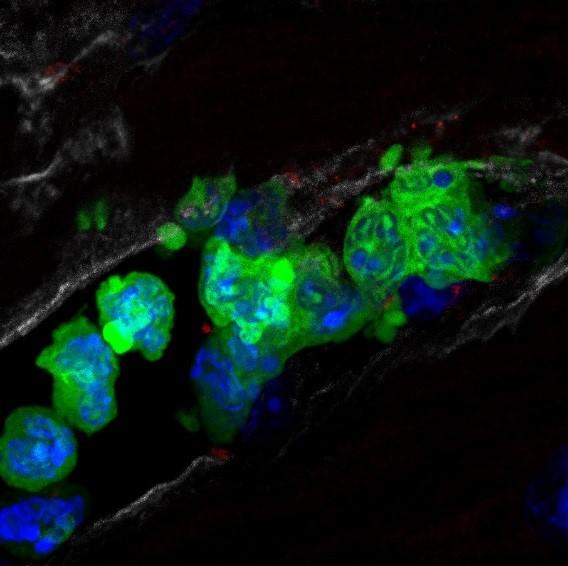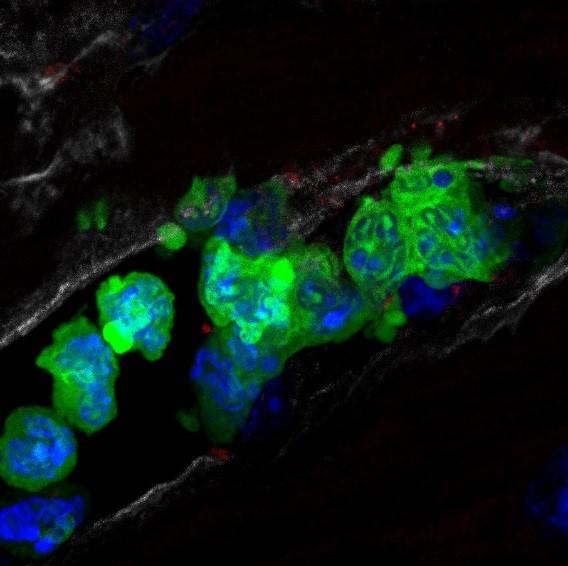
Credit: CNIC
Scientists at the Centro Nacional de Investigaciones Cardiovasculares Carlos III (CNIC) have discovered a new mechanism of action of metoprolol, a drug that can reduce the damage produced during a heart attack if administered early. The team led by Dr. Borja Ibáñez, Clinical Research Director at the CNIC and cardiologist at the Fundación Jiménez Díaz University Hospital Health Research Institute (IIS-FJD), has identified the mechanism that explains why this drug is so beneficial: rapid administration of metoprolol during a heart attack directly inhibits the inflammatory action of neutrophils, a type of blood cell. The reduced inflammation translates into a smaller area of damaged tissue in the post-infarcted heart. The finding, published in Nature Communications, opens the way to new applications for this cheap, safe, and simple drug.
Acute myocardial infarction is a serious disease that affects more than 50 000 people a year in Spain. Treatment has advanced a great deal in recent years, especially in the extensive use of coronary angioplasty, in which a catheter is used to re-establish blood flow through the blocked coronary artery. Nevertheless, many heart attack survivors have seriously impaired heart function that limits their long-term health and generates major costs to the health system. The search for treatments to limit the irreversible damage caused by a heart attack is an extremely important research area in terms of both patient care and health policy.
Neutrophils
Neutrophils are white blood cells that target and fight infections. In noninfectious diseases, neutrophils mount an excessive response, and after a myocardial infarction these cells attack the heart, contributing to the long-term injury and impaired function. "In an infarction," explained Dr. Ibañez "the most important thing is to re-establish blood flow as soon as possible. But unfortunately the incoming blood sets off an inflammatory process, started by neutrophils, that causes additional, permanent damage to the heart." This additional damage due to blood flow restoration is known as reperfusion injury, and has been regarded as a necessary evil because it is essential to unblock the coronary artery as rapidly as possible.
Metoprolol is a beta-blocker that has been in clinical use for more than 30 years and is a cheap drug (costing less than €2 per dose) of little commercial interest. In 2013, the METOCARD-CNIC clinical trial, led and coordinated by the same CNIC research team, showed that administration of metoprolol very early after an infarction reduces the size of the cardiac injury and improves long-term health. It has taken the team 7 years to determine why this simple and cheap pharmacological strategy is so effective.
The study published today in Nature Communications shows that early administration of metoprolol protects the heart by acting directly on neutrophils. "Metoprolol stuns the blood neutrophils, altering their behavior and limiting their injurious inflammatory action on cardiac muscle," explained first author Jaime García-Prieto. When coronary blood flow is re-established, neutrophils launch a complex and organized inflammatory reaction, with negative consequences. According to García-Prieto, "when neutrophils enter the infarcted heart tissue after the restoration of blood flow, they act disproportionately, inducing the death of cells that, while weakened, have survived the infarction." As Andrés Hidalgo, CNIC scientist and expert on neutrophils, explained, "neutrophil tissue invasion is intimately related to their interactions with platelets. Metoprolol blocks these interactions, drastically limiting the number of neutrophils arriving in the infarcted tissue." Moreover, impeding neutrophil invasion also prevents the formation of blood-cell aggregates that block the microcirculation in the post-infarction heart.
Dr. Antonio Fernández-Ortiz, study co-author and a cardiologist at the Hospital Clínico San Carlos, clarified that "we knew that platelets were an important factor in the clotting that causes an infarct, but until now we could not be certain that they also act together with neutrophils to magnify injury after blood flow restoration." Dr. Ibañez concluded that "the priority after a heart attack remains the restoration of blood flow as soon as possible, but we need to prepare the heart for this by administering metoprolol."
Also an author on the study is Dr. Valentín Fuster, CNIC General Director and Physician in Chief at the Mount Sinai Hospital in New York. Commenting on the study, he emphasized that "the imaging technology at the CNIC has allowed us to rapidly determine the status of a patient's heart after a heart attack, and this has enabled us to discover a new mechanism of action of this drug that we have been using for decades."
###
The study, coordinated by the CNIC, is an example of multidisciplinary networked collaboration involving not only the CNIC and the IIS-FJD but also the San Carlos Clinical Hospital, the Quirón Madrid University Hospital, Asturias Central Hospital, the Ruber Juan Bravo Hospital Complex, Basurto Hospital, and Mount Sinai Hospital in New York. Most of these centers are members of the recently created CIBER research network on cardiovascular diseases (CIBERCV) within the group led by Dr. Ibáñez. The study is the fruit of collaboration among cardiologists, ambulance emergency service staff, veterinarians, biochemists, physicists, and engineers, all of them participants in the CIBERCV consortium.
Media Contact
Fatima Lois
[email protected]
34-639-282-477
@@CNIC_CARDIO
http://www.cnic.es
Related Journal Article
http://dx.doi.org/10.1038/NCOMMS14780





